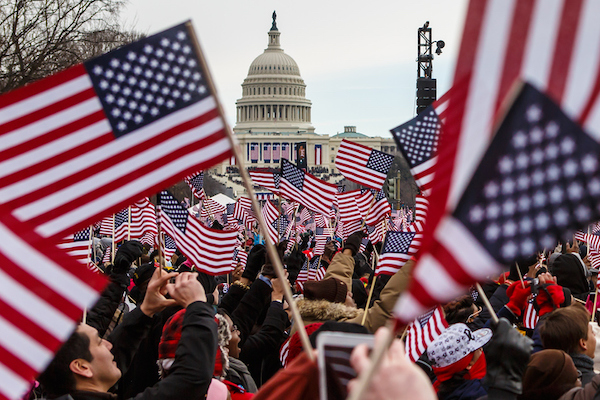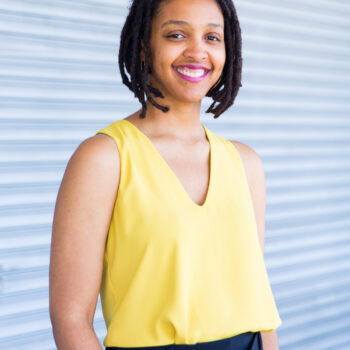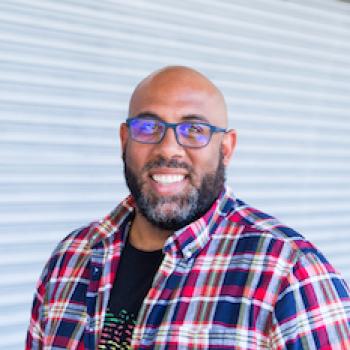In this episode of Raci$m Is Profitable, Demos President Taifa Butler joins Solana Rice and Jeremie Greer to explore governance. Many people of color have little confidence in government today, but it’s also the pathway to winning power in the economy. They talk about what it would look like to reimagine what governing could and should be — including redefining the relationship between elected officials and movements and rooting government in community.
This transcript has been edited and condensed. You can listen to the full episode here.
Jeremie Greer: When we talk about governance, we’re usually talking about voting. And I know, following you and following Demos, y’all look at governance more broadly than that. So how would you define governance? And why is it not just about voting?
Taifa Butler: Governance is about power. It’s about control. And it’s about, as Shirley Chisholm would say, if they don’t have a seat for you at the table, pull up a folding chair, bring in your own seat to influence the conversation, even when you’re not invited. As we have seen how this economy is set up, and how this democracy is set up, it has not been conducive to having the people who are most impacted by the decisions having a real say. We think democracy is just access to the ballot, but it is not. It is actually being able to influence and control the forces that shape our lives every day. And that’s what we at Demos have been really conscientious about, especially after this pandemic. As we reshape the current systems of our economy and our democracy, we want people, all people — and Black and brown people in particular — who have been most harmed by the system to be able to have a say.
Greer: There’s a lot of skepticism about government because government hasn’t always shown up in the best way in those communities. So I wonder if you could talk about what we have to do to overcome that.
Butler: For folks, like me, who’ve been in the research arena for a while it’s, you know, trying to show that policy can make a difference. It’s about solving public problems. That’s what public policy is all about. And when people don’t see government leaders helping to solve public problems, then they’re like, “Well, why should I even vote?” But I’ll say this one thing, Jeremie. Having done state policy work and being down in the Georgia legislature for 17-plus years, lawmakers would say to me, “Hey, Taifa, you know, we’ve read your report. Yeah, this is good information, but you know what? I haven’t heard from my constituents on this.” So people’s voice — whether they’re calling, they’re showing up at the Capitol, they’re writing letters — still make a huge difference. And we cannot forget that or forsake that.
Greer: I mean, if Citizens United said that money is voice, that means voice can also beat money, right?
Butler: That’s right. And I just think, the more that we can make the case for why government is good, why government can be a purveyor of the common good, the better we can improve this country. We have to continue to connect the dots: people’s voices still have to be lifted up, public pressure is so important for policymakers to be held accountable, and people have to stay engaged.
Rice: I’m curious about lessons that you’ve learned at the state level about governance.
Butler: We’ve got to think about mechanisms and practices to get people to have a seat at the table. And participatory budgeting is one of those things; it’s a co-governance model, it’s seen in like 7,000 jurisdictions around the world where people are actually engaged in how the dollars in the budgets are spent in their community. We need more of that, please and thank you. So those are just some of the things that we’re thinking about as we launch our economic democracy. How can we make sure that corporations are not controlling everything? And how do we get more people in impacted community to have a seat at the table? Where are there glimmers of communities taking control?
We just released a paper in partnership with Pittsburgh United. Public goods are incredible pieces of our economic democracy agenda. How do we keep public goods like water and utilities in public hands? In the Pittsburgh case study, we were able to show how government partnered with private entities and those private entities did harm to communities, particularly around cutting costs, not managing the water in the pipes, all of those things — and it had tremendous health effects to the community, but also increased costs. People saw their bills skyrocket.
And so what the community did was step up and say, “You know what? We need this public utility back in the hands of government and not in the hands of this corporation that is robbing us and killing us because of the health effects of our water not being clean and full of lead and all of that.” And they now have a community board in place to help work with the public water utility and authority to continue to have community oversight.
Greer: Narrative has been a big part of this podcast series. You were touching on some narratives there around saving money and how corporations do a better job than government. I wonder if there are any of these kinds of racist narratives that are driving the push away from participatory governance?
Butler: For so long, Black and brown communities have been undervalued to the point where our intellect, our ideas, our agency to be able to show up in a way that is valuable to our government leaders, our community leaders, has been negated. Instead of seeing us as liabilities, we need to continue to change the narrative. Having community members at the table who are closest to the issues — that is an asset. And when we govern in that way, it is beneficial to the community. If we believe in our democracy, we would create more practices and policies to help support and undergird that, as opposed to continuing to minimize who has a seat at the table.
Rice: What’s so important about what you’re lifting up is that voice is power, and that is sometimes met with economic retribution. LaTosha Brown of Black Voters Matter often says, yeah, we fight for voting rights every day. And at the same time, we are readying and steadying ourselves for economic retribution in these states, right? And clawbacks and clamping down on social services, all kinds of things. Because it is a demonstration of not only voting rights but participation in our governance is a demonstration of power.
Butler: Even with January 6, for example, or the critical race theory conversation — that is not a majority of voices, right? That is a minority of voices that have been well-resourced in a way that now they have a large megaphone and are making a lot of noise. And it’s a fringe group of people. How do we resource a few voices on our side to be able to elevate and provide a counter narrative or meta narrative to what we’re hearing from this fringe on the other side, which is about division and about supremacy and about nationalism and about centering whiteness. How do we resource that kind of communications effort and apparatus so that we are giving voice and credence to the rising majority.


